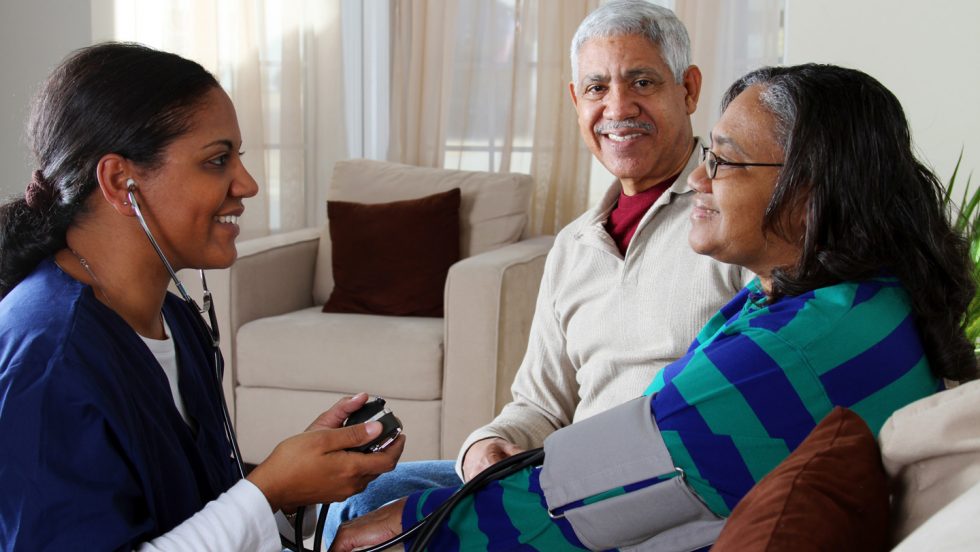
According to healthaffairs.org, more than 10,000 baby boomers turn 65 every day—leading to an unprecedented spike in the number of homebound adults relying on home-based primary healthcare. Yet, today, the quality of home-based care for the nation's older adults is highly inconsistent.
As a practicing nurse in New York City, Zainab Toteh Osakwe ’06, PhD, assistant professor of nursing and public health, saw firsthand the wide-ranging quality of home-based care available to the city’s elderly. As a result, she became a steadfast advocate for equitable care for the elderly—a position that’s at the heart of her research focus.
Most recently, Dr. Osakwe has been awarded a $50,000 research grant from the Claude D. Pepper Older Americans Independence Center (OAIC) at the Icahn School of Medicine at Mount Sinai Geriatrics to study the nationwide impact of state-regulated policies on the use of and access to home-based primary care delivered by nurse practitioners (NPs), especially in assisted living communities.
Filling an Urgent Need
Older adults unable to readily access office-based primary care—whether due to physical limitations or advanced dementia—often experience poor health outcomes, ranging from high hospitalization rates to frequent emergency room visits, even as their lives are drawing to a close.
Yet, according to Dr. Osakwe, as the number of older Americans needing in-home healthcare has grown, the number of primary care physicians has shrunk, particularly in rural areas. It’s a critical care shortage that has been exacerbated by the coronavirus pandemic.
As she sees it, there is an urgent need today to expand NPs’ ability to deliver high-quality primary care to those home- or assisted living-bound older adults who have trouble getting to a doctor’s office or are unable to.
“Nurse practitioners are the largest group of providers that deliver home-based primary care,” Dr. Osakwe noted. “And using NPs to deliver care to homebound elderly is a promising strategy, particularly when access to office-based care is difficult,” she noted.
Expanding on Prior Research
Dr. Osakwe’s new study fully aligns with other research initiatives. Even as a doctoral student at Columbia University, she focused on the quality and disparities of care received by homebound adults. Since then, she has broadened her research to include NP home-based primary care and dementia care for these patients—with a goal of developing interventions and informing policies that expand these elders’ access to home-based care.
A Nationwide Focus
Her OAIC-funded project will draw on a 2021 preliminary study she published in Geriatric Nursing that was the first to document the impact of state scope of practice laws on NPs providing home-based primary care.
According to Dr. Osakwe, her new study will link nationwide provider data from the Centers for Medicare and Medicaid Services to the U.S. Census American Community Survey socioeconomic disadvantage predictors to examine the effect of state nurse practitioner scope of practice regulations and assisted living nurse staffing policies on the utilization of home-based NP care.
She expects to find that states with restricted scope of practice laws will not only provide less home-based primary care, but will also rely less on NPs to provide this care.
The new study will additionally seek a better understanding at a geographic level of the rates of dementia in the areas served by NPs providing home-based primary care in assisted living communities.
A Meaningful Award
For Osakwe, the OAIC grant, which is awarded to early career researchers focused on the care of older adults with serious illnesses, is particularly meaningful. “It makes me feel that my research ideas and scholarship are being recognized by one of the most prestigious teams of geriatric researchers in the nation,” she said. “The Claude D. Pepper OAIC award also supports my career development as a nurse scientist focused on home-based care for older Americans through weekly mentored activities with noted scientists at Mount Sinai Geriatrics.”
She added, “Through these interactions and access to research teams, I’ll also be better able to have the time and preliminary data to develop a larger National Institutes of Health (NIH) grant, which is an expected outcome from this award.”
Equally important, it also helps Dr. Osakwe to engage a research assistant who had assisted on the preliminary study published in Geriatric Nursing while earning her master’s degree in public health at Adelphi. “I always have an Adelphi student on my projects, because I used to be a research assistant when I was a nursing undergraduate here at Adelphi,” she said.